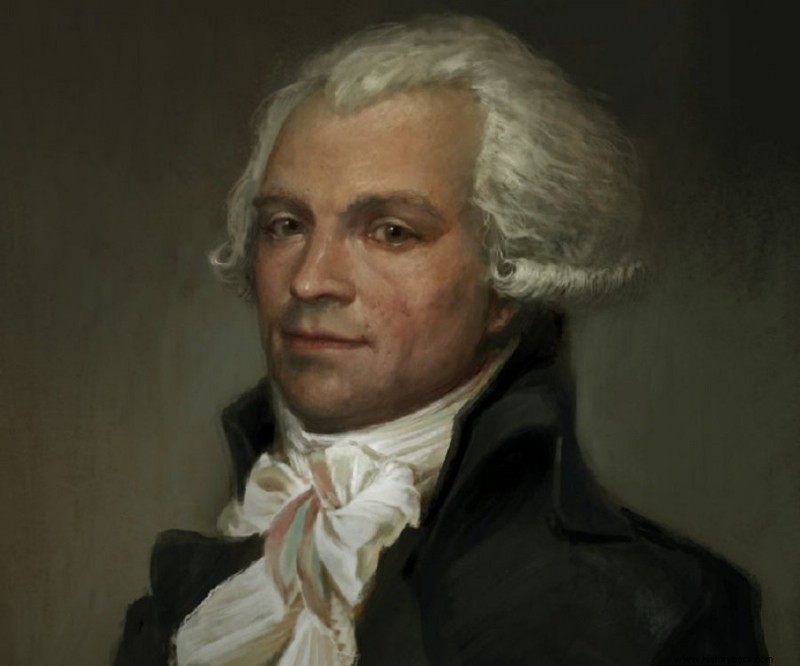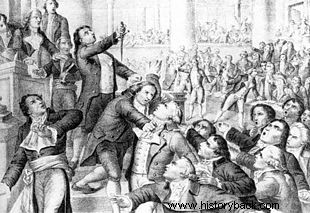
Maximilien Robespierre
Thanks to Stefania Di Pasquale , translator and collaborator of the Pole-Nord Group Brussels research group , which deals with the French Revolution and the figure of Jean-Paul Marat in particular, for sending Pills of History the article that I report below, or the vision of Terror and the fall of Robespierre according to the historian Albert Mathiez (find the results of the work carried out by Pole-Nord Group Brussels at this link: https://www.marat-jean-paul.org).
Personally I distance myself from the position expressed by the scholar, having a largely different vision of the event, but that of Mathiez is the opinion of one of the most illustrious historians on the subject and tries to shed light on a very controversial moment of the Revolution, on which there is probably still a lot to discover:good reading (also read https://www.pilloledistoria.it/10320/storia-moderna/simonne-evrard-la-moglie-marat).

Session at the 9th Thermidor Convention:Jean-Lambet Tallien brandishes the dagger against Robespierre
Explained by Historian Albert Mathiez.
-When revolutionary France , attacked at the borders by the Europe of the monarchies and torn within the struggle against those who wanted to come to terms with the enemy, the Public Health Committee he understood that the time had come to win or perish, concentrating his forces in an extreme attempt.
Robespierre, with such a meek and human soul, he played a decisive role in the implementation of a system of repression that was to make traitors feel fear and reduce them to impotence.
The man who at the time of the constituent, when "peace" reigned, had opposed the first laws against premature measures of exception, who had opposed the first laws against the clergy and emigrants, who had courageously assumed the defense of all rights and freedoms, he had proposed in vain the abolition of the death penalty, was dragged little by little to give his support to the contribution of the salvation of the Republic in danger from all sides.
In 1793 France was torn apart by factions, the civil war was added to the external one, a powerful party ( Gironde ) openly fought for the victory of the enemy, and then created a federal France and enlisted an army there, together with the traitor Dumouriez.
After the insurrection of 10 August , who removed the treacherous monarchy from the throne at the time of the Prussian invasion of Champagne, Robespierre took the initiative to establish the first Extraordinary Court , who should have tried the crimes against the Revolution.
The Girondins, united with the Royalists, raise up the departments, handing over Toulon from the British, Robespierre, Couthon, Collot d’Herbois, Billaud-Varennes, Danton and the other Montagnards, request the arrest of those responsible.
On May 31, 1793, the Girondist deputies are arrested, tried through the Revolutionary Court and sentenced to the guillotine in October 1793.
Toulon in the late 93 'was still under the British, and the Public Health Committee feared that the abrupt suppression of the revolutionary measures, the mass release of suspects, could trigger a violent reaction, which would have overwhelmed the Republic.
The imprudence and manipulations of the Dantonists, their shady intrigues in favor of a premature peace, their suspicious ties with corrupt men or even with declared monarchists contributed to instilling imprudence.
The Committee proclaimed that it was not the time to paralyze the energies of the nation and faced decisively against both right-wing and left-wing extremists.
Robespierre learned of the serious excesses of some members of the Public Health Committee, such as the massacres carried out by Carrier in Nantes, the behavior of Tallien in Bordeaux , the robberies and massacres made by Barras and Fréron in the south of France and the excesses of Fouché in Lyon, Robespierre had them all recalled and tried to block their activity, removing the revolutionary power from the impure hands of those who had abused it.
All these proconsuls recalled to Paris returned there with a spirit full of rancor, organizing together the killing of Robespierre, of Saint-Just , Couthon, Lebas, Augustin Robespierre and Dumas.
Robespierre in truth was looking for MODERATION, INDULGENCE, his concern against the religious prejudices of the people, the feast of the supreme being, the 20 pratile to reconcile believing citizens with the Republic, these are all proofs that he was gradually putting an end to the measures of exception. and with the total pacification of the country.
Finally, Robespierre is accused of having been a dictator, a kind of pontiff, without whose authorization nothing could be done.
Too easy to take the Thermidorians on their word.
He was in the minority in the Public Health Committee at the time of his alleged dictatorship.
The General Security Committee, which kept the Revolutionary Tribunal under its control, was almost unanimously hostile to him.
The 9 Thermidor it was not the work of men who wanted to put an end to terror, but on the contrary of men who had abused terror and who wanted to take it to infinity, to create a cover.
But as these men were overwhelmed by the events, having failed to stop the reaction they had unintentionally triggered, and having identified for tactical reasons Robespierre, Saint-Just and Couthon with excesses, the legend has formed that the latter were the personification of Terror (by Albert Mathiez ).
